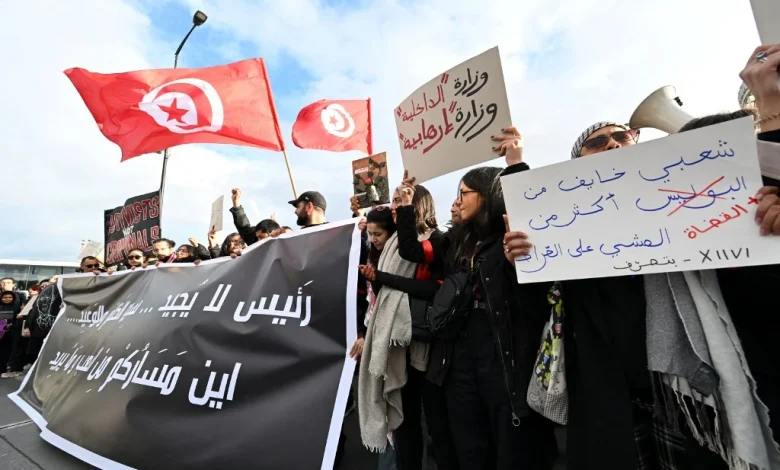Tunisia appeal court upholds heavy prison sentences in ‘conspiracy’ trial

About 40 opposition figures in Tunisia have been sentenced on appeal to prison terms of up to 45 years in a controversial trial over “conspiracy against state security” and “belonging to a terrorist group”.
The 37 defendants, most of whom were imprisoned after their arrest in the spring of 2023, were accused of, among other things, meeting with foreign diplomats.
In the initial trial in April, the defendants were handed heavy prison sentences of up to 66 years after just three hearings and without closing arguments.
Right groups have condemned the trial as “politically motivated”, while Volker Turk, the UN high commissioner for human rights, denounced “violations of the law raising serious concerns about political motivations”.
According to local media, the defendants received sentences ranging from 10 to 45 years on appeal.
New MEE newsletter: Jerusalem Dispatch
Sign up to get the latest insights and analysis on
Israel-Palestine, alongside Turkey Unpacked and other MEE newsletters
The harshest was handed down to businessman Kamel Ltaief, who was sentenced to 45 years, reduced from 66 years in the first instance, while opposition politician Khayam Turki was sentenced to 35 years, down from 48 years.
Prominent opposition figures Jawhar Ben Mbarek, Ghazi Chaouachi, Ridha Belhaj and Issam Chebbi saw their sentences increased from 18 to 20 years, as did human rights activist Chaima Issa.
Ben Mbarek has been on a hunger strike for a month to protest against his detention, which he has described as “arbitrary” and “unjust”.
Tunisia using arbitrary arrests to silence dissidents, report finds
Read More »
Ahmed Nejib Chebbi, co-founder with Ben Mbarek of the National Salvation Front, one of the main opposition coalitions, was sentenced to 12 years in prison, reduced from 18 years in the first instance.
Lawyer Ayachi Hammami was sentenced to five years, down from eight. Tried while free, he now faces an imminent risk of arrest, as do Issa and Ahmed Nejib Chebbi.
Other detainees saw their sentences reduced on appeal, including former minister and Ennahda leader Noureddine Bhiri, whose jail term was reduced from 43 to 20 years.
For defendants on provisional release or abroad, the court handed down sentences of up to 35 years, while acquitting two: Noureddine Boutar, the director of the private radio station Mosaique FM, and Lazhar Akremi, a lawyer and former secretary of state.
Feminist activist Bochra Belhaj Hmida and French intellectual Bernard-Henri Levy, tried in absentia, had their 33-year sentences upheld on appeal.
‘A relentless campaign to silence dissent’
“The decision by the Tunis Court of Appeal to hold the unjust convictions in the so-called ‘conspiracy case’ is an appalling indictment of the Tunisian justice system,” said Sara Hashash, Amnesty International’s deputy regional director for the Middle East and North Africa.
“The Court of Appeal has rubber stamped the government’s use of the justice system to eliminate political dissent,” she added, citing repeated violations of due process, including the courts’ unjustified decision to deprive detained defendants of their right to be present in the court room and insist on holding the trial remotely.
“Combined with the state’s continued targeting of lawyers representing defendants in the case, these actions expose a relentless campaign to erode rights and silence dissent.”
Four years after the coup in Tunisia, opposition divisions benefit Saied
Read More »
On Thursday, the EU Parliament voted by an overwhelming majority for a resolution calling for the release of Tunisians detained for exercising their freedom of expression.
Kais Saied, Tunisia’s president, on Friday condemned the EU resolution as “blatant interference”. “They can learn lessons from us on rights and freedoms,” he said in a video statement.
Since Saied’s coup d’etat in the summer of 2021, in which he granted himself sweeping powers, Tunisian and international NGOs have denounced a rollback of rights and freedoms in Tunisia, the birthplace of the Arab Spring.
In a separate case, Tunisian lawyer and prominent columnist Sonia Dahmani was granted conditional release on Thursday after 18 months of detention and several convictions at trial, under a presidential decree that punishes the dissemination of “false information”.
Rights defenders have criticised the decree, denouncing the courts’ overly broad interpretation.





